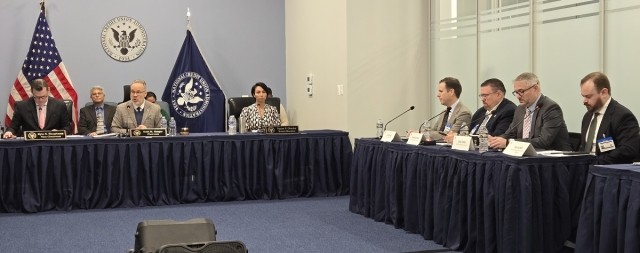Long: Increased NCUA expenditures placing ‘undue burdens’ on credit unions
Significant concerns with the NCUA’s proposed 2025-2026 budget were shared by America’s Credit Unions, the GoWest Credit Union Association, and Defense Credit Union Council (DCUC) Friday at the agency’s public briefing. The proposed 2025 budget is a 12.2% increase over 2024, and the 2026 budget grows an additional 7.5%.
Agency staff noted during the briefing that federally insured credit unions that meet the following criteria will be on a 12 to 16-month examination cycle (extended from the normal eight to 12 months for credit unions with more than $1 billion in assets):
- Between $1 billion and $10 billion in assets;
- With a CAMELS code of 1 or 2; and
- No change in CEO since its last exam.
America’s Credit Unions has requested NCUA consider these changes consistently, including in the written testimony submitted for the hearing.
During his remarks, America’s Credit Unions Head of Emerging Issues/Deputy Chief Economist Curt Long said the primary concern is the proposed budget is too high, especially when inflation “is approaching the Federal Reserve’s 2% target.”
“These expenditures place undue burdens on federally insured credit unions and the 140 million members who directly fund agency operations,” Long said. “If finalized as proposed, the 2025 NCUA budget will require a $9,000 operating fee from the median federal credit union, along with a pro rata transfer of share insurance fund equity of over $5,000. That cost has grown 47% in just four years.”
John Trull, GoWest’s vice president of regulatory advocacy, noted the large rise in the mission support budget, which is more than 51% of operational budget. If the Office of Consumer Protection had not been reallocated this year, the mission support budget would have – for the first time – exceeded the examination and supervision budget.
“It is essential we address these financial dynamics to ensure the NCUA’s sustainability and support for its valuable personnel without diverting funds from NCUA’s core supervisory responsibility,” Trull said.
Jason Stverak, chief advocacy officer at DCUC, added the budget growth “appears disproportionate to growth in the credit union industry and the risk facing credit unions.”
Long examined the NCUA’s budget in detail in this month’s Economic Update, and America’s Credit Unions will submit detailed written comments on NCUA’s budget before the Nov. 27 deadline.
